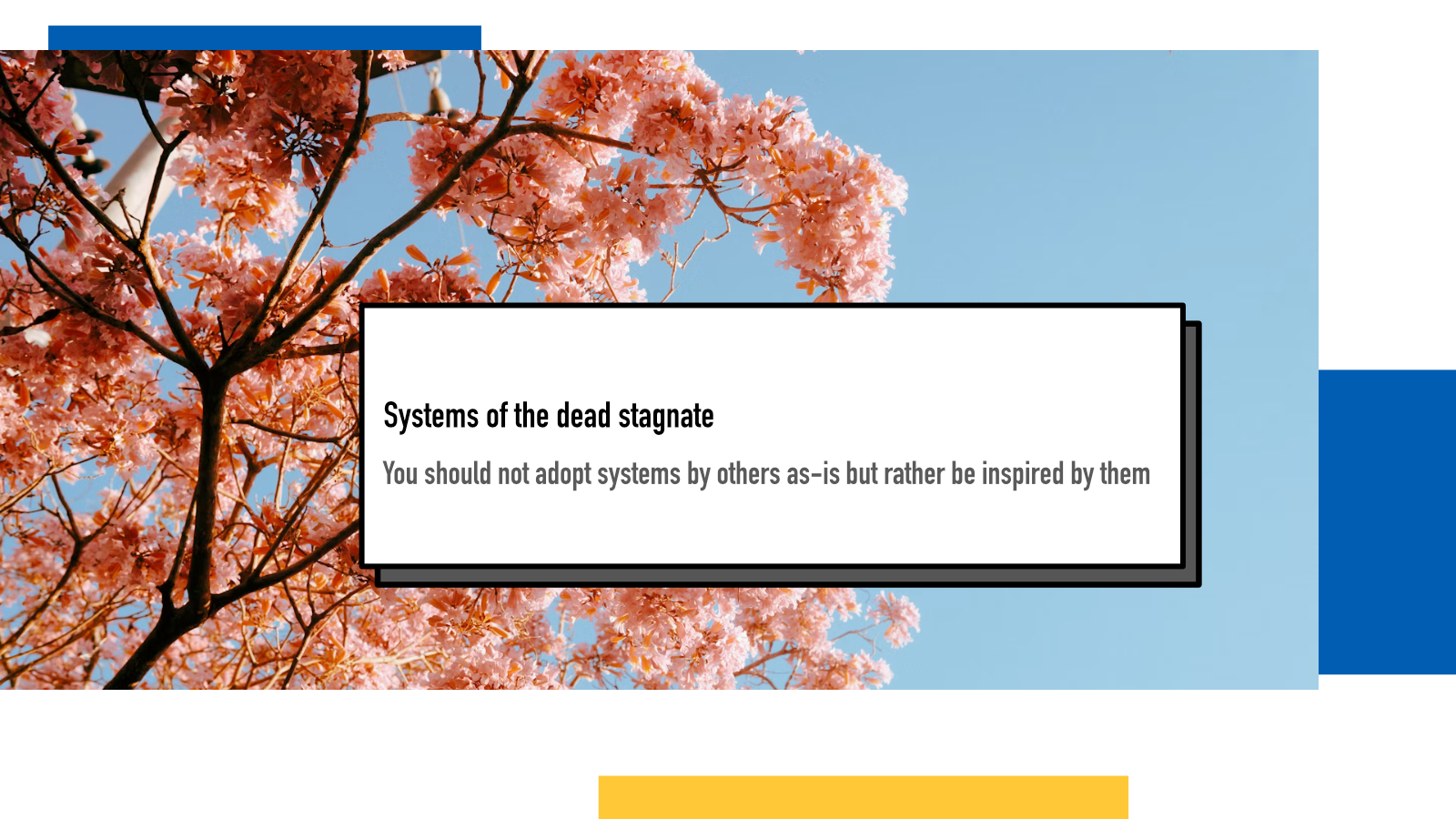Systems of the dead stagnate

The recent rise of content creators and influencers has created a situation where not only we have more ideas being shared but we have so many ideas productized. Creators need to find new ways to grow their brand and business and wrapping your ideas into something that can sell merch, online courses, books, trainings and other products and services around your idea is one very popular way to do it.
I read and watch a lot of stuff in note-taking and writing space and that's especially full of these things and participating in the online discussion, I've started to consider this a highly negative trend. I like the idea that people share what they do and the more ideas there are out there, the more there's to draw inspiration from.
Here's the problem though: when you put a label on it, people start to hang on to that label even to their own detriment. I've read countless forum posts where people ask if they can do X where X is something they'd like to do but they have chosen to follow a System™ and they don't know if it fits that system. That's a red flag number 1.
Red flag number 2 is when people get into heated arguments about what fits those systems with various labels and completely ignore the true question: is the proposed idea something that is helpful or beneficial to one using the system.
Whether these systems are called Zettelkasten or Bullet Journal or Johnny Decimal or PARA or Second Brain or whatever, I don't think it's beneficial to adopt a system as-is. Take inspiration, sure but don't hang yourself or someone else on it because someone productized their set of ideas at one point in time.
The truth is: the creators don't hang themselves on those snapshots of ideas. They keep evolving their systems (maybe sometimes publishing them as "updates" to the idea), dropping things that don't work and so on.
I believe most systems start organically, growing to the needs of the creator. At some point, when they have come up with a somewhat coherent system they can polish, they share a snapshot of it that other people start to adapt. But these people themselves do the smart move and keep iterating, evolving and adjusting the system. Anyone who buys into these systems will at that point stay stuck to that one snapshot.
A while back, Kai Klostermann wrote an interesting piece Please Start from Textbook in which he argues that before people (or teams) start to adjust systems to their own need, they should first follow the textbook version until they reach a level of unconcious competence:
Now, that does not mean you can't adapt a given standard to fit your scenario perfectly. No, absolutely not. However, please be very diligent with it and create small feedback loops. Start to adapt only, when you are in a state of unconscious competence. Only then you have the profound knowledge it takes to communicate why your approach is different.
He uses an example of Scrum and brings up a notion that often causes difficulty when people have different ideas on how strict these systems are. People who came up with Scrum, define it as immutable: if you make any changes to the system, it's no longer Scrum.
I kind of understand the reasoning — both from branding and communication perspectives — but I consider it a bad approach. I think it limits the discussion to something someone once decided and good new ideas don't get experimented with and shared because purists then say it's not the System™ anymore and thus off topic for discussion on System™ forums.
Sure, when we talk about ideas, it's important to be clear on what's being discussed. I do believe however that being flexible with change is the better direction both for individuals themselves as well as the larger discussion.
It makes me a bit sad when people so often ask if they can do something, especially if it's something like their own notes or their team's processes just because they started from or were lured into selecting a System™. Asking for ideas and experiences is always welcomed but stop asking for permission from the stagnated system.
I love discussing note-taking approaches with people and I used to happily share existing ideas and frameworks but I've noticed that thanks to the strong content creator influence, people so often feel like it's complicated to start writing notes or using tools like Obsidian because they saw a video or two of people selling these ideas of note-taking frameworks or dozens of plugins you "must have".
If content creators don't make their claims extrabold and assertive, Youtube/TikTok/X algorithm won't be pleased with them so we have ended up with platforms where even good information is hidden inside this bullshit approach.
My advice for starting to write notes: make a note. Forget tools and frameworks and meta ideas. Start writng notes. With pen and paper on a notebook or index cards. Or with Obsidian/Apple Notes/emacs/vim/Word/whatever-tool-you-have-at-hand.
Once you start to notice that your notes could use some extra organising and you want to get more out of them, look into what ideas are out there. Crucially, don't start from scratch or rebuild your entire system. Instead, pick one good individual idea at a time and adapt it to your system in a way that works with you.
Despite what the influencer tell you, what matters is the thinking process that happens when you make notes.
If something above resonated with you, let's start a discussion about it! Email me at juhamattisantala at gmail dot com and share your thoughts. This year, I want to have more deeper discussions with people from around the world and I'd love if you'd be part of that.